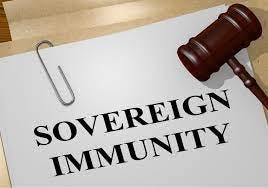The 11th Amendment to the Constitution
The Eleventh Amendment is the only amendment written specifically for the federal judiciary.
Photo Credit: Elephango.com
Issue # 241 Government, February 2, 2023
The Speaker of the House for the 118th Congress, Kevin McCarthy (R-CA) promised that on the first day of the new Congress on January 3, 2023, members of the House would read the entire Constitution.
Well, we know what happened, it took 15 votes, almost 5 days, and giving away the store for McCarthy to secure the gavel. We are still waiting for that reading of the Constitution.
So, in the meantime, here on “We Are Speaking,” we will continue to discuss each of the seven articles and twenty-seven amendments to the Constitution.
The 11th Amendment, the first amendment passed after the 10 amendments that make up the Bill of Rights, states:
The Judicial power of the United States shall not be construed to extend to any suit in law or equity, commenced or prosecuted against one of the United States by Citizens of another State, or by Citizens or Subjects of any Foreign State.
State Sovereignty
The 11th Amendment to the Constitution of the United States established the principle of state sovereign immunity, where states are shielded from lawsuits brought by citizens of other states or from foreign countries.
In Article III, Section 2 of the original Constitution, the federal judiciary was given the authority to decide any controversies between a state and the citizens of another state. However, in 1793, the Supreme Court of the United States (SCOTUS) permitted a suit to be brought by a citizen of South Carolina against the state of Georgia, in Chisholm v Georgia.
Because Congress was afraid that similar suits would be brought against states, a proposal was submitted on March 4, 1794. By 1795, twelve of the then-15 states (2/3 of the states) ratified the amendment and it became law. South Carolina ratified the amendment in 1797, but New Jersey and Pennsylvania never ratified the 11th Amendment.
The article continues below.
No intrusive ads or annoying popups ever! Instead, please see the important information below and at the bottom of this post. That’s how we grow and sustain this publication. AND, please keep those “Likes” and comments coming! Thanks!
There is new lower pricing for the paid levels at as little as $5.00/month or $50/year!
Paid subscribers with the Substack app are invited to participate in the W.A.S. Chat Room to discuss today’s post.
All posts are free for seven days after their publication. To read all older posts, including the complete archive, and to support us financially, please consider upgrading your subscription to a paid level. Save 17% with an annual subscription. Thank you for your support!
The article continues…
The 11th Amendment to the United States Constitution, ratified in 1795, was the first instance of constitutional law that dealt with limiting the jurisdiction of the U.S. Supreme Court.
The primary goal of the 11th Amendment was to overrule the earlier decision made by the Supreme Court (Chisholm v Georgia ) involving federal sovereign immunity and claims made against states by citizens from other states or foreign nations.
The Eleventh Amendment prohibits the federal courts from hearing certain lawsuits against states. The Amendment means that state courts do not have to hear certain suits against the state if those suits are based on federal law.
As lawsuits keep coming concerning the validity of the 2020 election and many states trying to outlaw protections for reproductive rights, LGBT rights, and what can and cannot be taught in public schools, it is important to remember who has “standing” to bring a suit. Suits by citizens of a state against their own state are permitted. Lawsuits by other states, and suits by the United States to enforce federal laws, are also permitted.
The Supreme Court has continued to extend the meaning of the Eleventh Amendment over the years. In 1997, the Court expanded the meaning of the Eleventh Amendment to make it more difficult (but not impossible) to sue state-run colleges and universities.
This is important to remember as state Republican governors, including Youngkin in Virginia and DeSantis in Florida, are pressuring public school boards and tax-payer-funded state colleges and universities to all but erase the study of African American history, LGBT topics, or anything else besides “white, western civilization and culture.”
The pressure from DeSantis recently caused the College Board to purge the names of many Black writers and scholars associated with critical race theory, the queer experience, and Black feminism. It ushered out some politically fraught topics, like Black Lives Matter, from the formal curriculum.
Meanwhile, the Board added “Black conservatism” as an idea for a research project.
The provisions of the 11th Amendment are also important as many states and the new slim Republican House Majority try to enshrine severe abortion restrictions even as the SCOTUS repealed Roe v Wade in 2022.
Many state supreme courts have struck down abortion bans as unconstitutional based on the 11th and 14th amendments, but the anti-abortionists keep trying.
The 11th Amendment in the 20th and 21st Centuries
The Eleventh Amendment is controversial largely because of the rights it gives to the individual states. Courts, lawyers, legislators, and private citizens have debated the powers of the federal government and the powers of the states ever since the end of the Revolutionary War.
The Eleventh Amendment granted state governments more power. It gave both the federal government and the state governments some clear power over the federal courts by proving that constitutional amendments could overturn unpopular Supreme Court decisions. Constitutional amendments were proven effective in compensating for the power of judicial review. In turn, Supreme Court decisions gained a greater degree of acceptance as solutions to constitutional legal disputes.
The Eleventh Amendment remains the only amendment written specifically for the federal judiciary.
It is important that we keep abreast of all of the attempts at chipping away our rights granted by several of the amendments to the Constitution and how and when lawsuits against the various states can be successful or are judged to be frivolous.
What do you think? Let us know in the comments or start a dialogue in the chat (for paid subscribers).
Help us to grow our We Are Speaking Substack!
Don’t Forget! If you have the W.A.S. app for iOS and Android, you can listen to each article by clicking the little headset icon. You can also participate in the W.A.S. Chat (for paid subscribers only).
There are many benefits to using the W.A.S. app, including the ability to listen to our posts and podcast episodes straight from the iOS or Android app.
Have you thought about starting a Substack publication of your own? It’s quick, easy, and free!
You can always leave any questions in the comments or email us.
Free posts are available for 7 days after publication. Adjust or upgrade your subscription to the paid level here. Pay less than 14¢ per post for the 36 monthly articles and podcast episodes. Thank you for your financial support!
Read Detroit Stories Quarterly by Keith Owens, et al.
Check out the Global Creative Community Branding and Marketing Academy (GCC BMA) offering online courses networking opportunities, and one-on-one and group coaching for independent writers and creative and solo professionals.








